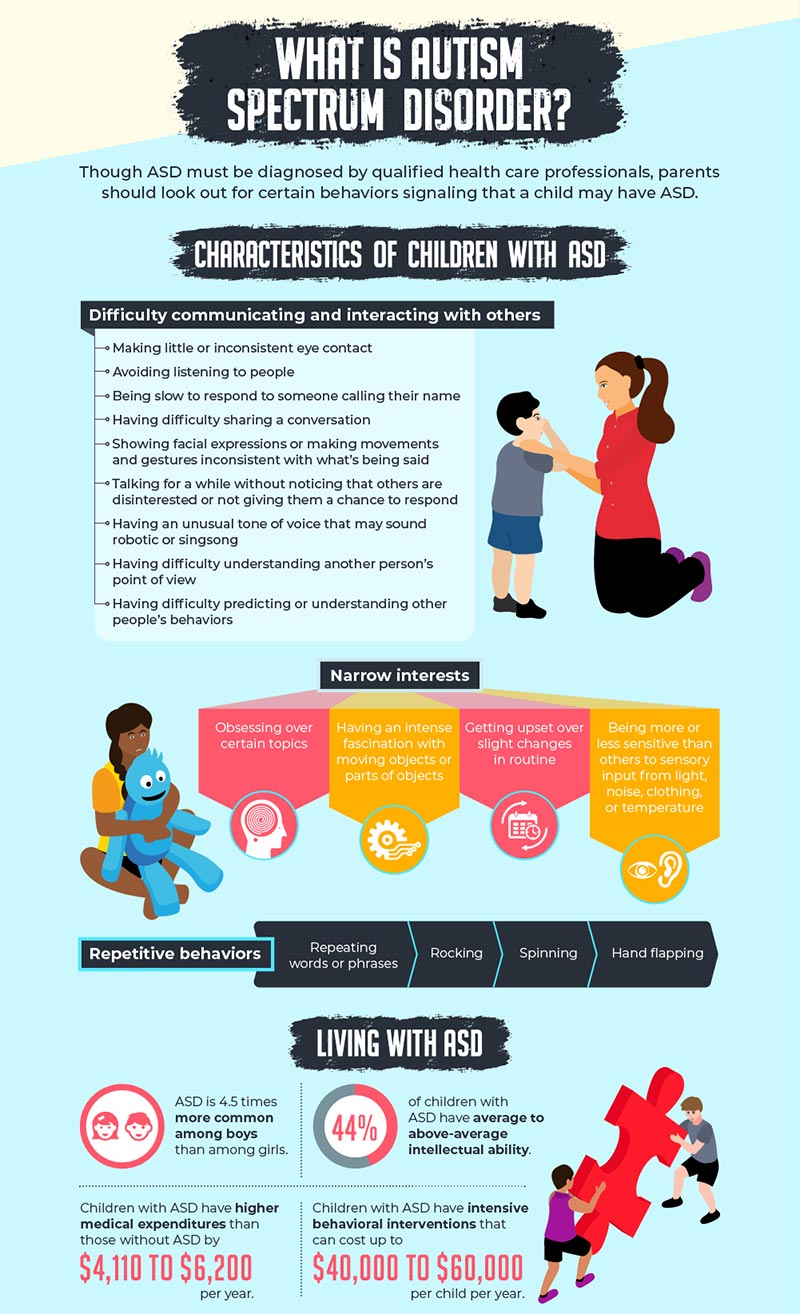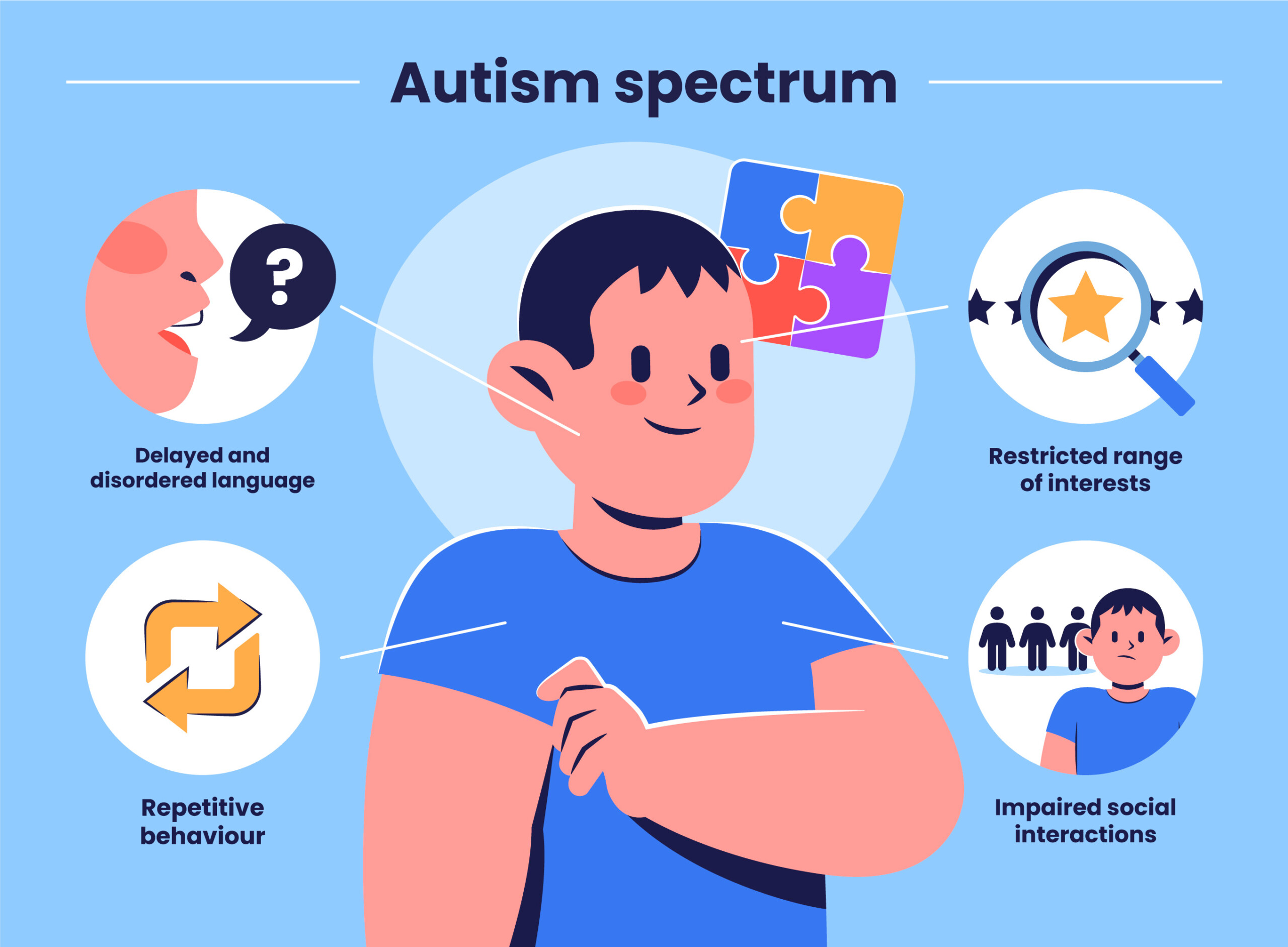Is your child’s behavior a sign to consider seeing an Aba Therapist near you?
Is your child’s behavior a sign to consider seeing an Aba Therapist near you?
Blog Article
Understanding the Influence of Behavioral Autism on Every Day Life and Social Interactions
You might not understand exactly how deeply behavior autism impacts daily life and social communications. Individuals on the range commonly navigate a world filled with communication difficulties and sensory overload. These difficulties can lead to disappointment and isolation, impacting their relationships and overall wellness.
Defining Behavioral Autism and Its Features
Behavioral autism, typically described as autism range disorder (ASD), incorporates an array of conditions characterized by obstacles in social communication, interaction, and repetitive behaviors. You might observe that people with ASD commonly struggle to translate social cues, which can lead to misconceptions in discussions. They may discover it hard to establish eye call or engage in small talk, making social scenarios feel frustrating.
Interaction difficulties can materialize in various methods, from postponed speech advancement to a choice for making use of less words. By identifying these qualities, you can promote a setting that advertises approval and encourages efficient interaction, aiding people with autism flourish in their everyday communications.
The Range of Autism: Comprehending Variability in Behavior
Autism range problem (ASD) isn't a one-size-fits-all diagnosis; it differs widely among individuals. You might come across people who are extremely verbal and engage conveniently in conversations, while others could favor solitary tasks or communicate non-verbally.
Moreover, the means individuals with ASD reply to sensory input can vary considerably; some may be overwhelmed by loud sounds or bright lights, whereas others prosper in promoting atmospheres. The spectrum likewise consists of differences in social communications; some individuals might battle to translate social cues, while others browse social settings with relative simplicity. Understanding this variability is vital, as it assists you value each person's one-of-a-kind experience and tailor support to their details demands, promoting a more comprehensive environment for everyone.
Interaction Challenges Dealt With by People With Autism
When you engage with individuals on the autism spectrum, you might observe their one-of-a-kind communication difficulties. They commonly encounter difficulties with both nonverbal and spoken signs, which can influence their social interactions. Recognizing these obstacles is vital for cultivating better connections and support.

Verbal Interaction Problems
Many individuals on the autism range experience verbal communication troubles that can substantially affect their everyday interactions. You might find it challenging to reveal your ideas, feelings, or needs clearly. This can result in frustration for both you and those around you, as misconceptions occur. You may battle with initiating conversations, maintaining a subject, or understanding subtleties in speech. Often, you might prefer using easy language or repetitive expressions, which can limit your ability to involve in deeper conversations. Your pace, tone, or volume might not straighten with social expectations, creating others to misinterpret your objectives. Acknowledging these difficulties can assist you and your support network create approaches to enhance communication and foster far better links with others in your everyday life.
Nonverbal Communication Obstacles
Verbal communication isn't the only difficulty individuals on the autism spectrum face; nonverbal interaction obstacles can be equally as substantial. You may locate it challenging to analyze body language, face expressions, and eye get in touch with, which are important for reliable interaction. These challenges can bring about misunderstandings or false impressions of social cues, making communications feel complicated or frustrating. You may struggle to express your own feelings through nonverbal methods, leaving others uncertain of your purposes or feelings. This detach can create sensations of isolation and aggravation. Identifying these obstacles is critical for cultivating understanding and empathy in your interactions. By attending to nonverbal interaction, you can find approaches to improve your social experiences and improve your general lifestyle.
Social Interaction Effects
Social communications can often feel frustrating as a result of the one-of-a-kind interaction difficulties dealt with by individuals with autism. You might have problem with interpreting social cues, making it difficult to comprehend sarcasm or body language. This can lead to misunderstandings or unpleasant moments in conversations. Furthermore, starting and keeping conversations may really feel difficult, triggering stress and anxiety in social situations. You may prefer organized atmospheres, making spontaneous communications unpleasant. It's also typical to experience trouble in involving in small talk, which can hinder forming brand-new friendships. Recognizing these obstacles can aid you discover strategies to enhance interaction, such as practicing social abilities in risk-free settings or using visual aids - Autism Spectrum Therapies. Understanding your needs allows you to browse social interactions with better confidence and convenience.
Social Interaction and Partnership Structure in Autism
While building connections can be testing for individuals with autism, comprehending their one-of-a-kind point of views and interaction designs can cultivate significant links. click for source You could notice that numerous people on the spectrum prefer direct interaction and may deal with social signs or small talk. By being simple in your communications, you can aid develop a setting where they really feel comfy.
Make the effort to observe and pay attention just how they share themselves. This understanding can lead you in guiding discussions better. Taking part in shared passions can additionally offer as a bridge to much deeper links. Whether it's a leisure activity, a favorite show, or a mutual passion, these common threads can open doors to friendship.
Day-to-day Live Regimen: Browsing Strategies and challenges
Maneuvering daily life routines can be specifically testing for people with autism, particularly when unexpected adjustments take place. You may discover comfort in having an organized timetable, as it assists you anticipate what's following. When interruptions happen, it's normal to feel overwhelmed or anxious. To navigate these obstacles, think about applying aesthetic schedules or lists. These tools can provide quality and peace of mind.
Developing a regimen that includes sensory breaks can also be valuable. You can intend time-outs throughout your day to charge. It's vital to connect with those around you, letting them understand your preferences and demands. This aids develop an understanding setting.
Finally, method mindfulness techniques to handle stress and anxiousness. Simple breathing workouts or basing techniques can make a substantial distinction. By incorporating these approaches, you can enhance your daily regimen and decrease disruptions, making life feel a lot more manageable.
Staminas and Abilities of People on the Autism Range
Understanding daily life routines is just one facet of the autism experience. Many people on the autism range possess exceptional staminas and capabilities that set them apart.
Furthermore, your memory skills typically shine, especially in locations of passion. Autism Behavioral Therapy. This propensity for retaining information can make you a valuable source in fields like scientific research, art, look these up or modern technology. You may likewise exhibit solid visual reasoning, allowing you to visualize intricate ideas and resolve issues creatively
Additionally, your distinct perspective on the globe can foster compassion and understanding in others, enhancing social communications. Accepting these toughness not only enhances your confidence yet likewise helps others value the diverse skills you offer the table.
Producing Comprehensive Environments for People With Autism
Creating inclusive settings for individuals with autism begins with designing sensory-friendly rooms that accommodate their distinct needs. You can additionally promote opportunities for social communication, aiding to build links and relationships. By making these adjustments, you'll contribute to an extra welcoming atmosphere for every person.
Creating Sensory-Friendly Spaces
While creating sensory-friendly rooms, it's vital to reflect on the one-of-a-kind requirements of individuals with autism. Incorporate silent areas where people can pull away and recharge when overwhelmed. Include aesthetic routines or clear signs to aid individuals browse the room with confidence.
Promoting Social Interaction Opportunities
Designing sensory-friendly areas not just addresses specific comfort but also establishes the stage for significant social interactions amongst individuals with autism. To advertise these communications, create comprehensive atmospheres that welcome involvement. Arrange organized activities, like art courses or group games, that urge collaboration without frustrating sensory input. Use aesthetic aids and clear interaction to help every person engage pleasantly. Motivate peer mentoring, pairing people with autism with helpful peers that can assist them via social scenarios. Furthermore, take into consideration holding normal community occasions that celebrate neurodiversity, promoting acceptance and understanding among all individuals. By applying these approaches, you can boost social opportunities, helping individuals with autism build relationships and enhance their social skills in a risk-free, welcoming atmosphere.

Frequently Asked Questions
How Can Friends Support Someone With Behavioral Autism?
You can support a pal with behavioral autism by holding your horses, paying attention proactively, and valuing their borders. Take part in activities they enjoy, connect honestly, and develop a comfy atmosphere where they feel valued and understood.
What Resources Are Available for Moms And Dads of Kid With Autism?
You can check out various resources for parents of youngsters with autism, including support groups, instructional sites, and regional area services. Getting in touch with various other parents can additionally provide important understandings and shared experiences to assist navigate obstacles.
Can Behavioral Autism Change Gradually?

Yes, behavioral autism can alter with time. You could see shifts in communication, social abilities, and habits as your youngster grows. Early intervention and support frequently play essential roles in these developing modifications.
Exactly How Do Sensory Sensitivities Influence Daily Life?
Sensory level of sensitivities can make daily experiences overwhelming. You may fight with loud sounds or intense lights, causing stress or avoidance. Discovering environments that fit your demands can substantially boost your comfort and total every day life.
What Prevail Misconceptions Concerning Behavioral Autism?
You might believe Continued behavioral autism only impacts communication abilities, yet it's even more complicated. Lots of assume people do not have empathy or knowledge, which isn't true. Recognizing these mistaken beliefs aids foster acceptance and assistance for those on the range.
Behavior autism, often referred to as autism spectrum problem (ASD), incorporates an array of problems defined by difficulties in social communication, interaction, and repetitive behaviors.Social interactions can often feel overwhelming due to the unique communication challenges encountered by individuals with autism.Creating sensory-friendly spaces not only addresses specific comfort however likewise establishes the phase for meaningful social interactions among people with autism. Encourage peer mentoring, combining individuals with autism with supportive peers who can assist them via social circumstances. By executing these methods, you can boost social chances, assisting individuals with autism construct friendships and strengthen their social abilities in a risk-free, inviting setting.
Report this page